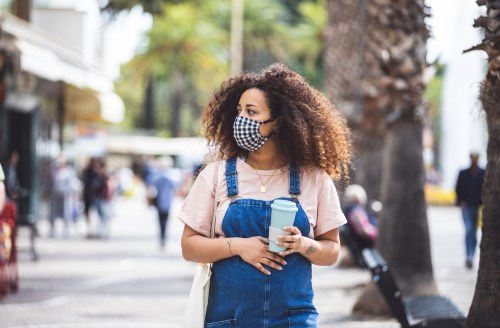The coronavirus epidemic has changed a lot about becoming and being a parent, forcing some couples who rely on fertility treatments to delay their baby-making plans and other expectant parents to grapple with giving birth alone. Now, some new evidence suggests that pregnant people with the coronavirus are more likely to be hospitalized and put on a ventilator than people of the same age who are not pregnant. Given that other infectious diseases in recent years have had serious implications for parents and babies (from HIV being transmissible from mother to child to the Zika virus causing serious birth defects), compounded by the serious health risk of COVID-19 itself, it’s understandable for expectant parents (or people who want to become parents) to be deeply concerned.
Experts in This Article
Brenna L. Hughes, MD, is an OB/GYN and maternal-fetal medicine specialist at Duke Health in Durham, North Carolina.
Richard H. Beigi, MD, is a professor of reproductive sciences at the University of Pittsburgh Medical Center.
As doctors do their best to keep up with shifting evidence around COVID-19 risk during pregnancy, recommendations from leading health groups have evolved. “We’re making the best recommendations we can based on the available evidence from around the world and past experiences from other outbreaks. We’re not flying blind, but we do wish we had more data,” says Richard Beigi, MD, a professor of reproductive sciences who researches infectious disease prevention at the University of Pittsburgh Medical Center in Pittsburgh, PA. (He is also a co-author of the American College of Obstetricians and Gynecologists’ (ACOG) COVID-19 practice advisory, which informs how gynecologists and obstetricians treat patients during this time.)
Health experts are quick to point out that there’s a glaring lack of research on pregnancy and COVID-19. In fact, hospitals aren’t even required to fill out detailed information about the outcomes for pregnant people admitted to the hospital for COVID-19. “Like most things with COVID, it’s so new we are still dealing with essentially a dearth of information,” says Brenna Hughes, MD, an OB/GYN and maternal-fetal medicine specialist at Duke Health in Durham, NC, and another co-author of ACOG’s COVID-19 practice advisory.
Early data seemed to suggest that pregnant people weren’t at greater risk of infection or severe complications from COVID-19, says Dr. Hughes. The Centers for Disease Control and Prevention (CDC) initially said that the virus doesn’t seem to affect pregnant people differently than others. The agency later conceded that pregnant people “might be at increased risk for severe illness” as well as pregnancy complications like preterm birth following its own data analysis. We asked Dr. Beigi and Dr. Hughes to help us unpack these findings—and to understand how they can affect every part of pregnancy:
What does the research tell us about the effects of COVID-19 on pregnancy?
1. Possible increased risk for ICU admission and mechanical ventilation
The CDC’s June 2020 report was the largest to-date on COVID-19 infections during pregnancy, which looked at symptoms and outcome data from 8,207 pregnant women in the U.S. who tested positive for COVID-19. An analysis of the data suggested that pregnant people with COVID-19 were at about a 50 percent increased risk of ICU admission and a 70 percent increased risk of mechanical ventilation compared to non-pregnant women of the same age, but that they were not at increased risk of death. “Thankfully the risk [of death] is still very low and lower than what we see with most medical conditions,” says Dr. Hughes.
According to the report, Hispanic and non-Hispanic Black pregnant women seemed to be “disproportionately affected” by COVID-19. This tracks with the national data currently available on COVID-19, which found that Latinx and Black Americans are three times as likely to contract COVID-19 than their white neighbors thanks to systemic racism that affects health-care access, employment status, and treatment by medical professionals.
Having certain chronic health conditions also appears to increase the risk of more severe outcomes whether or not you’re pregnant. A much smaller study released in May by Oxford researchers concluded that pregnant people generally weren’t at greater risk of severe illness due to COVID, but having certain risk factors while pregnant—being older, overweight or obese, or having preexisting conditions including diabetes and high blood pressure—increased the risk of hospital admission. This might further explain why the CDC report found that Hispanic and Black pregnant women were the most affected by COVID-19, as those populations are disproportionately affected by conditions like diabetes and high blood pressure (again, thanks in large part to systemic racism that impacts health-care access and affordability as well as access to healthy, affordable food, among other factors.)
2. Potential increased risk of preterm birth
The CDC notes that there may be an increased risk of preterm birth for pregnant people with COVID-19. “A small number of other problems, such as preterm (early) birth and other problems with pregnancy and birth, have been reported in babies born to mothers who tested positive for COVID-19. We do not know if these problems were related to the virus,” the CDC reports. Dr. Hughes says that the CDC’s own analysis didn’t have enough data to prove a correlation, but that other smaller reports have noted a link.
3. Possible COVID-19 complications right after birth
There have been a few case studies showing some severe complications associated with people who give birth while sick with COVID-19. Two women were documented as experiencing a variety of severe symptoms after giving birth, such as tachycardia (very rapid heart rate), sudden difficulty breathing, and uncontrollable bleeding, although it’s unclear if it was related to COVID-19. During the 2009 flu pandemic, moms seemed to be some increased risk in the two weeks postpartum, says Dr. Beigi, but it’s unclear if the same is true for the coronavirus. For now, there just isn’t enough solid data to suggest worse outcomes for moms infected with the virus later in pregnancy.
“There are definitely women who have become very sick and even died from COVID during pregnancy, but I’ve heard of cases in early pregnancy all the way up to postpartum,” says Dr. Hughes.
4. Unlikely transmission from mom to baby immediately after birth
It’s unlikely your unborn baby will get infected if you catch COVID-19 during pregnancy, despite scattered reports of this type of transmission happening. “People can feel reassured there’s a very low risk,” says Dr. Hughes.
There haven’t been clear cases of transmission during labor and delivery either, says Dr. Hughes. Transmission usually happens when newborns are exposed to sick parents after birth, and they don’t seem to get severely sick. “Current data suggests [the coronavirus] does not commonly transmit to the baby nor does it seem to be a significant neonatal problem,” says Dr. Beigi.
5. Unknown risks during the first trimester
The one area where there just isn’t enough data to make any conclusions is whether getting sick with COVID-19 during the first trimester increases the risks of miscarriage or developmental anomalies in babies, notes Dr. Hughes.
But why would COVID-19 potentially have a greater effect on pregnant people in the first place?
Again, there’s a lot we don’t know about COVID-19 and how it can affect pregnant people. But doctors have some theories based on how the body changes during pregnancy itself. Dr. Hughes says that any increase in problems during pregnancy may be because the immune system is slightly tamped down. “It’s good because it allows the body to carry a fetus, but some viruses tend to be worse in pregnancy,” she says. (Which is why, amongst other precautions, experts emphatically recommend pregnant people get a flu shot.)
The increased need for ventilation among pregnant COVID-19 patients could be linked to decreased lung capacity in the third trimester. As the baby takes up more space in the abdomen, the respiratory effects of COVID-19 make breathing even more difficult, says Dr. Hughes, although she notes this theory hasn’t been backed with any data.
Several factors could potentially slightly increase the risk of preterm birth. “Sometimes we deliver early when moms aren’t doing well,” says Dr. Beigi. Dr. Hughes adds that inflammation with COVID-19 infections could be at play in preterm birth, since other inflammatory conditions like appendicitis can put pregnant people at risk of delivering early. “What we don’t know is if that’s happening with COVID, and if it is, what the mechanisms would be. It’s definitely an area of research that needs to be developed,” she says.
Theoretical issues in the first trimester of pregnancy could be related to fever: Some research suggests that a high fever in the first trimester may be linked to birth defects, although it’s far from conclusive.
Finally, for any risks to moms immediately postpartum, “it may be an extension of being recently pregnant. I don’t know of any other reasons being immediately postpartum poses more risk,” says Dr. Beigi. Since blood clots are a serious risk for both late pregnancy and postpartum and COVID-19, Dr. Hughes says that pregnant people who are hospitalized for COVID-19 and at risk of clotting receive anti-clotting medication as a precaution.
What precautions should pregnant people be taking now?
It’s important to take the same COVID-19 precautions recommended for everyone else. ACOG and CDC suggest that pregnant people:
- Attend all scheduled prenatal care appointments
- Wear a mask at work and in public
- Wash their hands frequently
- Stay at least 6 feet away from others
- Maintain social distancing as much as possible
All of these measures really can make a difference. “Most of the reports of outbreaks are when people are unmasked,” says Dr. Hughes.
It’s also important to stick to existing vaccination recommendations and get the Tdap and flu shots during pregnancy. Pregnant people are at higher risk for bad outcomes if they catch the flu, says Dr. Hughes. And infants can die from whooping cough; getting the Tdap vaccine during pregnancy provides newborns with some protective antibodies from Mom until they’re old enough to get vaccinated themselves. “Now it’s more important than ever to protect babies and moms from other respiratory viruses that we know can cause bad outcomes,” says Dr. Hughes.
While there aren’t any official recommendations to work from home at any point during pregnancy, getting sick just before you deliver can make it harder to take care of your newborn, says Dr. Beigi. So if you’re concerned about your exposure to the coronavirus at work during your third trimester, talk to your supervisor about getting reassigned to a job where you interact less with others, if possible.
How does COVID-19 affect labor and delivery?
A birthing center or hospital is still the safest place to deliver, even during a pandemic. “The cleaning and attention to infection control measures have never been greater,” says Dr. Hughes. While many hospitals are taking lots of precautions to prevent the spread of COVID-19 in all areas of the hospital, the actual labor and delivery experience should hopefully feel similar to pre-coronavirus times. “It’s a happy and special occasion,” she says.
If you don’t have COVID-19 symptoms, your hospital may or may not test you for the virus when you arrive, say Drs. Beigi and Hughes. Once you’re admitted, you’ll probably be more restricted in your movements around the hospital than in the past. You’ll also likely be allowed fewer visitors. Dr. Beigi’s hospital is filling in the gap by offering iPads so laboring people can connect with loved ones. You can expect your hospital to allow one support person in the room with you and possibly a doula or midwife.
Any person who’s present at your birth will be required to wear a mask and other personal protective equipment. Many hospitals also encourage laboring moms who have a confirmed case of COVID-19 to wear a mask. “But we realize for some women it’s very difficult,” says Dr. Beigi.
After delivery, the CDC strongly recommends separating babies from parents who are sick with COVID-19. But it’s ultimately your decision after you weigh the risks and benefits of rooming in versus separation. “The risks will vary tremendously based on how ill a mom is,” says Dr. Hughes. If you have few or no symptoms, you’re far less likely to infect your baby than if you have an uncontrollable cough and can’t wear a mask.
What precautions should you take if you’re trying to conceive right now?
Before TTC, be sure you’re up-to-date on all of your vaccinations. Otherwise, it’s simple but crucial to take good care of yourself: Get plenty of sleep, eat well, and exercise. “All of these things help with the stress of COVID and improve outcomes related to pregnancy,” says Dr. Hughes. (And of course, follow all of the above-mentioned social distancing best practices.) If you need to work with a fertility specialist, know that some clinics are starting to re-open after the initial closures required by the pandemic. Some places might have changed their hours, scheduling protocol, and what services they can provide.
There’s a lot still to learn about pregnancy and COVID-19, but both Dr. Hughes and Dr. Beigi stress that it’s generally still safe to be pregnant during this time. “The overwhelming majority of pregnant women who get sick with COVID-19 do just fine,” Dr. Beigi says. Hopefully with more research, we’ll better understand how to help those who have poor outcomes—and how to prevent them from happening in the first place.
Sign Up for Our Daily Newsletter
Get all the latest in wellness, trends, food, fitness, beauty, and more delivered right to your inbox.
Got it, you've been added to our email list.











